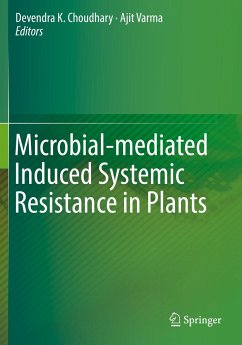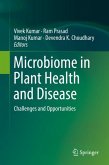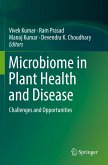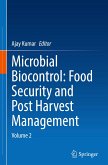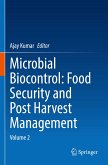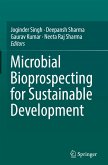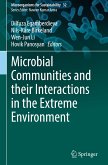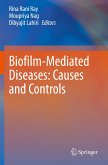With a focus on food safety, this book highlights theimportance of microbes in sustainable agriculture. Plants, sessile organisms that are consideredas primary producers inthe ecosystem and communicate with above- and below-ground communities thatconsist of microbes, insects, and other vertebrate and invertebrate animals, are subjected to various kinds ofstress. Broadly speaking, these can be subdivided into abiotic and bioticstresses. Plants have evolved to develop elaborate mechanisms for coping with and adapting tothe environmental stresses.
Amongother stresses, habitat-imposed biotic stress is one serious condition causingmajor problems for cropproductivity. Most plants employplant-growth-promoting microorganisms (PGPMs) to combat and protect themselves from stresses and alsofor better growth.
PGPMsare bacteria associated with plant roots and they augment plant productivityand immunity. They arealso defined as root-colonizing bacteria that havebeneficial effects on plant growth and development. Remarkably, PGPMs includingmycorrhizae, rhizobia, and rhizobacteria (Acinetobacter, Agrobacterium,Arthrobacter, Azospirillum, Bacillus, Bradyrhizobium, Frankia, Pseudomonas,Rhizobium, Serratia, Thiobacillus) form associations with plant roots andcan promote plant growth by increasing plants' access to soil minerals and protecting them against pathogens.
To combat the pathogens causing different diseases and other biotic stresses, PGPMs produce a higher level ofresistance in addition to plants'indigenous immune systems in the form of induced systemic resistance (ISR).
The ISR elicitedby PGPMs has suppressed plant diseases caused by a range of pathogens in boththe greenhouse and field. Assuch, the role of these microbes can no longer be ignored forsustainable agriculture.
Today,PGPMs are also utilized in the form of bio-fertilizers to increase plantproductivity. However, the use of PGPMs requires a precise understanding of the interactions between plants and microbes, betweenmicrobes and microbiota, and how biotic factors influence theserelationships. Consequently, continued research is needed to develop newapproaches to boost theefficiency of PGPMs and to understand the ecological, genetic and biochemicalrelationships in their habitat.
Thebook focuses on recentresearch concerning interactions between PGPMs and plants under biotic stress. It addresses key concernssuch as -
1.The response of benignmicrobes that benefitplants under biotic stress
2.The physiologicalchanges incurred in plants under harsh conditions
3.The role of microbialdeterminants in promotingplant growth under biotic stress
Thebook focuses on a range of aspects related to PGPMs such as their mode of action, primingof plant defence and plant growth in disease challenged crops, multifunctionalbio-fertilizers, PGPM-mediateddisease suppression, andtheeffect of PGPMs on secondary metabolites etc.
Thebook will be a valuableasset to researchers and professionals working in the area ofmicrobial-mediated support ofplants under biotic stress.
Amongother stresses, habitat-imposed biotic stress is one serious condition causingmajor problems for cropproductivity. Most plants employplant-growth-promoting microorganisms (PGPMs) to combat and protect themselves from stresses and alsofor better growth.
PGPMsare bacteria associated with plant roots and they augment plant productivityand immunity. They arealso defined as root-colonizing bacteria that havebeneficial effects on plant growth and development. Remarkably, PGPMs includingmycorrhizae, rhizobia, and rhizobacteria (Acinetobacter, Agrobacterium,Arthrobacter, Azospirillum, Bacillus, Bradyrhizobium, Frankia, Pseudomonas,Rhizobium, Serratia, Thiobacillus) form associations with plant roots andcan promote plant growth by increasing plants' access to soil minerals and protecting them against pathogens.
To combat the pathogens causing different diseases and other biotic stresses, PGPMs produce a higher level ofresistance in addition to plants'indigenous immune systems in the form of induced systemic resistance (ISR).
The ISR elicitedby PGPMs has suppressed plant diseases caused by a range of pathogens in boththe greenhouse and field. Assuch, the role of these microbes can no longer be ignored forsustainable agriculture.
Today,PGPMs are also utilized in the form of bio-fertilizers to increase plantproductivity. However, the use of PGPMs requires a precise understanding of the interactions between plants and microbes, betweenmicrobes and microbiota, and how biotic factors influence theserelationships. Consequently, continued research is needed to develop newapproaches to boost theefficiency of PGPMs and to understand the ecological, genetic and biochemicalrelationships in their habitat.
Thebook focuses on recentresearch concerning interactions between PGPMs and plants under biotic stress. It addresses key concernssuch as -
1.The response of benignmicrobes that benefitplants under biotic stress
2.The physiologicalchanges incurred in plants under harsh conditions
3.The role of microbialdeterminants in promotingplant growth under biotic stress
Thebook focuses on a range of aspects related to PGPMs such as their mode of action, primingof plant defence and plant growth in disease challenged crops, multifunctionalbio-fertilizers, PGPM-mediateddisease suppression, andtheeffect of PGPMs on secondary metabolites etc.
Thebook will be a valuableasset to researchers and professionals working in the area ofmicrobial-mediated support ofplants under biotic stress.

